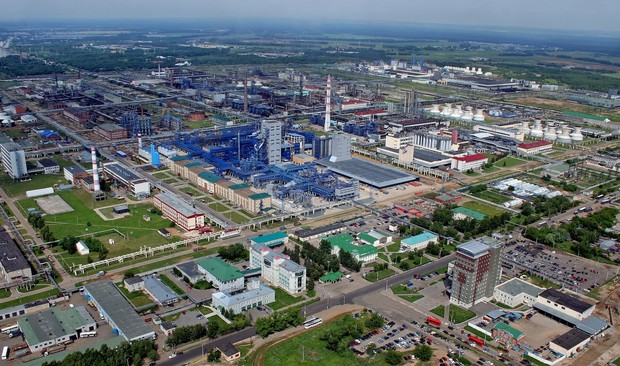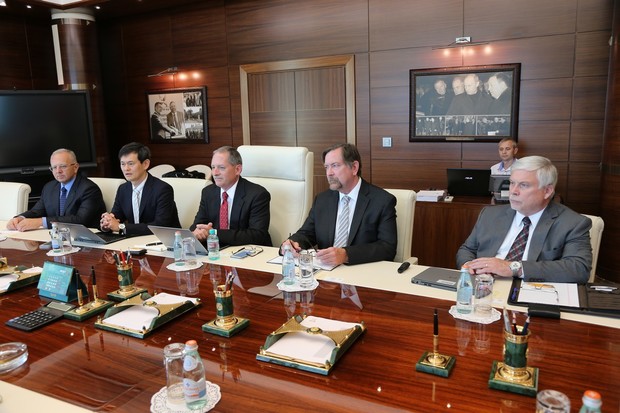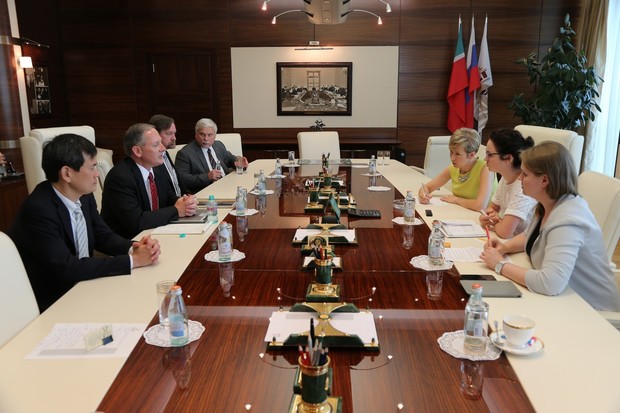Steven Stanley, Univation: ‘We want to thoroughly examine the opportunity to expand here in Russia’
Univation Technologies has been licensing polyethylene production and producing catalysts for almost 50 years. Their UNIPOL™ PE Process Technology accounts for 1/3 of the global polyethylene market. President of the company Steven Stanley came to Kazan in order to talk about their further cooperation with TAIF GC. Realnoe Vremya online newspaper managed to talk to the head of the American enterprise and knew about the state of affairs in Russian polyethylene market, how one should adapt productions of old plants according to market requirements and why the technology has good support.
New catalysts for old facilities
Mr Stanley, what Russian companies are you working with today?
We are working with the companies we started to work with a long time ago. We licensed Kazanorgsintez in 1977. The plant was put into operation in 1983. Stavrolen in Budyonnovsk was awarded Univation's licence in 1989, and it started in 1992. The production in Lukoil Factory in Karpatneftekhim was put into operation in 1996. We licensed it in 1992. Actually we have been dealing with a big number of companies on a regular basis for several decades. We do ongoing technical support to the existing operations of these facilities and supply polyethylene catalysts.
Is the product made by the equipment that were put into operation a long time ago still in demand?
A key factor for licensees is that their facility will be in operation for 30-40 years or longer. The types of products change rather dramatically over the years. Since the beginning of licensing UNIPOL PE technology in 1968, we have led the industry consistently over that period of almost 50 years in new brand catalysts, new resin capabilities that ensure the licensee's plant never gets obsolete but is always on the forefront of technology.
What is done for that purpose?
Our UNIPOL PE gas phase technology is the most flexible technology on the market, which means it can manufacture the broadest range of products. So a customer can maximise the return no matter which product is making the most money at one particular time or another.
We spent a significant amount of our revenue bank on technology innovation that's geared towards giving its advanced capabilities as low cost, implementable capabilities even on the oldest UNIPOL PE reactors that were installed. If you look at KOS's reactors that started after 1983, now they are rather old but they are running some of the most sophisticated products.
All in all, reactors operate reliably and produce the highest percentage of the targeted resin that they want to make. It is very important.
In addition, we have a world-class delivery organisation. It means we assist our licensees and all phases of the design, construction, commissioning, start-up, and, most importantly, many-many years of support after the start-up.

Univation licensed KOS to expand polyethylene production in 2004. What other projects unite the two chemical enterprises?
There is a potential capacity project involving the reactor B. These discussions are still early. It depends on ethylene feedstock availability.
Market leaders and criteria for licensees
Do you have a big global footprint presence of the company?
We have polyethylene manufacturing facilities across the entire world now representing over 145 reactor lines with 40m tonnes of polyethylene production per year. The main area of focus in Univation on licencing is for high density (HD) and linear low density (LLD) polyethylene. Our technology represents about 1/3 of the global polyethylene capacity. And if we talk about swing plants capable of both HD and LLD PE production, we have an over 50% market position. That makes us the global leading licenser of polyethylene technologies.
What other companies are taking the lead in polyethylene production?
Leaders change as time goes by, of course. Some other participants in polyethylene licensing are Mitsui, LyondellBasell Industries, Chevron Phillips Chemicals, NOVA Chemicals, and INEOS. These companies and Univation are the main players in the polyethylene licensing industry. Each of the above-mentioned companies are very selective in licensing.
What criteria should a licensee correspond to?
From a licensee perspective, the capital cost is one of the key factors. Univation has the lowest capital cost for HD and LLD PE than any of the licensers that I've mentioned. Another aspect is that all these plants consume ethylene. Many of them are tied to a very expensive ethane cracker technology that costs a significant amount of money. They want to make sure the technology risk of the polyethylene plant is very low. Otherwise, they are risking a very huge sum of money.
We have been in the business of licensing UNIPOL PE technology successfully for almost 50 years. It puts us three times larger on installed capacity successfully producing polyethylene than our competitors. Technology risk for implementing our technology is very low.
The second major trend that has been occurring in the industry is the increase of the size of these ethane crackers. They now can get up to 1,5 to 2m tonnes of ethane per year. From a polyethylene perspective, it means the potential licensee is now looking at very large single-train polyethylene facilities. Univation has multiple licensed reactors operating as large as 650,000 tonnes per year with a minimised technology risk. This size is significantly larger than any other proven size by any of the licensers that I've mentioned previously.

It is known your company is going to update UNIPOL PE technology together with Linde. In what areas do you cooperate with the German company?
Linde has been a Univation bidding contractor for several decades. What Linde brings to this industry is highly advantaged ethane cracker technology for ethylene production, which is a feedstock for UNIPOL PE technology. We are looking for cost reduction, capital reduction opportunities that would lower the amount of capital required to put on and run the facility.
'We always keep our privacy policy'
Your company that has a rich story went through a drastic change – the business structure changed last year. The company became a 100% subsidiary of the chemical giant The Dow Chemical Company. So how has the strategy in the world and particularly in Russia changed?
Yes, the ownership has changed. The Dow Chemical Company is the head company, but we are a separate legal entity and wholly owned subsidiary of Dow. We always keep our privacy policy. Even before the May 2015 transaction, we had a board of directors made up of The Dow Chemical Company senior executives and ExxonMobil Chemical senior executives. The Dow Chemical representation has been involved in crafting, approving our strategic initiatives and projects of Univation for years. This is why there was no major structure or strategy change since the executives have been involved in crafting that strategy for many years. Any industry that exists today is impacted to various degrees by global competition. We on a very frequent basis look at our strategy and decide what modifications and improvements can be made that would better the position of our capital for profitable growth.
What market share do you aspire to have?
We don't actually have a target market position or share that we aspire to. We don't compromise on the value of our technology or on terms or conditions for the sake of trying to achieve a particular market position or share in the world just to try to gain a license and achieve a market position number.

Difficulties in joint ventures
You were offered to open a catalyst plant in Alabuga SEZ. Have you ever thought to start a production in Russia from a logistical perspective?
It is an interesting concept. We will seriously consider it. Joint ventures are a more complicated environment. They are often used as means to gain access to a new market. But they are also often used as means to a different destination. One of the partners typically is not going to be in the business for the duration of the future. This is why Univation or, more importantly, The Dow Chemical Company, need to very carefully evaluate joint venture opportunities both strategically, financially, and fundamentally whether it fits the overall plans that we have for business growth that we are seeking. Having said that, several interesting and compelling reasons were given by TAIF. And we want to thoroughly examine the opportunity to expand here in Russia. It is what we will seriously examine within the company.
In 2013, there were many talks about a stagnation in Russian polyethylene market. In 2014, there was a real decline in demand. What tendencies are we having now?
Domestic consumption within Russia is, of course, growing. But it tends to grow slowly. What is changing is the opportunity to use Russia's low-cost feedstocks to supply a large quantity of polyethylene on the market that is in great need of it, and that is in China.